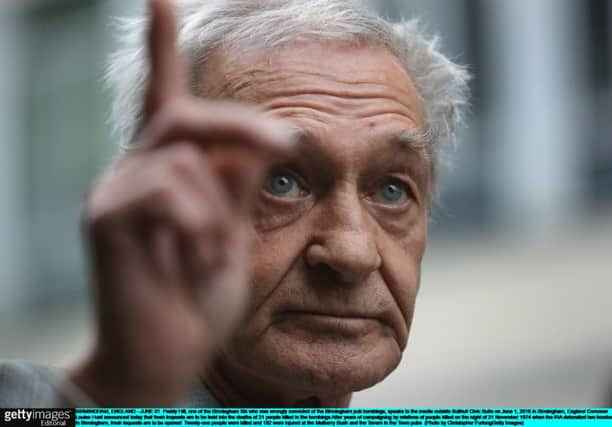Leaders: Birmingham pub bombings | Undercover police probe


Yesterday’s ruling by coroner Louise Hunt comes only five weeks after a jury at the Hillsborough inquests found 96 football fans were unlawfully killed at the football ground, 25 years after the original inquest delivered a verdict of accidental death.
Although the Birmingham bombings are an act of terrorism, which is a world away from a crush at a football ground, the subsequent investigations have striking parallels.
Advertisement
Hide AdAdvertisement
Hide AdFor a start, Ms Hunt pointed to the “wealth of evidence” that has not been heard about the bombings, with the original hearings discontinued after the jailing of six men over the incident (whose convictions were later overturned). At Hillsborough, the original inquest heard no evidence of events after 3:15pm on the day of the tragedy, a fundamental misjudgment only put right when a new inquest was opened in 2014.
West Midlands Police were found to have made serious mistakes over the bombing, and tried to block the coroner’s deliberations by disputing her jurisdiction to hear inquests. And at Hillsborough, South Yorkshire Police continued to defend the indefensible when a new inquest was opened, inflicting prolonged suffering on the grieving families.
Furthermore, the new Hillsborough inquest revealed a lie that had led to a disgraceful cover-up which lasted 27 years. Meanwhile, over at Birmingham, a 1991 reinvestigation of the bombings by West Midlands was subject to a Devon and Cornwall Police inquiry – but the Director of Public Prosecutions put a 75-year embargo on files relating to that investigation. If that is not a cover-up, it is at the very least deeply unsatisfactory. Denial of information always gives the impression that the withholder has something to hide.
However, the parallels seem to end there. West Midlands Police Chief Constable Dave Thompson welcomed yesterday’s decision by the coroner, and his open and honest statements contrast with those of his South Yorkshire counterpart, David Crompton, who was immediately suspended after the Hillsborough unlawful killing verdict.
“West Midlands Police will support this inquiry as we have done through the recent hearings by the coroner which determined whether the inquest should reopen,” said Chief Constable Thompson. “I hope the new inquest provides answers to families.”
And here, again, the narrative departs from Hillsborough. The coroner warned yesterday there is no guarantee that new evidence will provide conclusive answers. A lengthy inquest may leave us no closer to knowing the full story behind the Birmingham bombings.
But on this occasion, at least the bereaved families have reason to believe that there is a determination to put all available facts out in the open. Chief Constable Thompson is to be commended for his refreshing attitude to tackling his force’s darkest hour, and the focus can now turn to taking this shameful saga to as satisfactory a conclusion as is possible.
Police inquiry must be inclusive
The revelations that undercover police officers had infiltrated environmental and social justice groups assuming different identities and had gone on to have long term-relationships and in some cases fathered children with duped women were truly disturbing.
Advertisement
Hide AdAdvertisement
Hide AdAfter almost five years, the Metropolitan Police was last year forced to make multi-million pound payouts to seven women to end a court action they were pursuing. The Metropolitan police issued a fulsome apology and admitted that the relationships were a violation of human rights and an abuse of police power.
So serious were the revelations that a judge-led inquiry was set up, the Pitchford inquiry, and that is ongoing. Now there are fresh cross-party calls for it to be extended to Scotland.
It has been claimed that undercover Met officers, including Mark Kennedy, one of five officers known to have had relationships with women, infiltrated environmental groups in Scotland ahead of the Gleneagles G8 summit.
Scottish justice minister Michael Matheson wrote to Home Secretary Theresa May himself in December 2015 asking for the inquiry’s remit to be expanded,
Labour MSP Neil Findlay’s says that there is a growing body of evidence that covert officers operated in Scotland and engaged in discredited practices. We know operations were not limited to England as Kennedy has said he was also employed by German police in Berlin.
It is hard to see how this inquiry can go ahead in England and Wales but Scotland is excluded. Surely Scottish politicians – and people – cannot be denied this inquiry given the nature of the allegations.